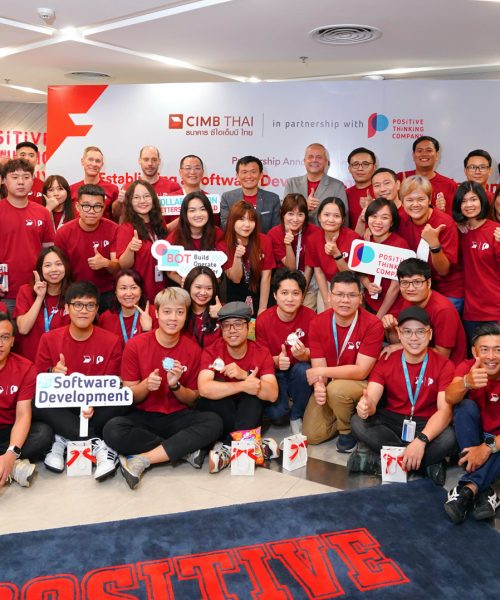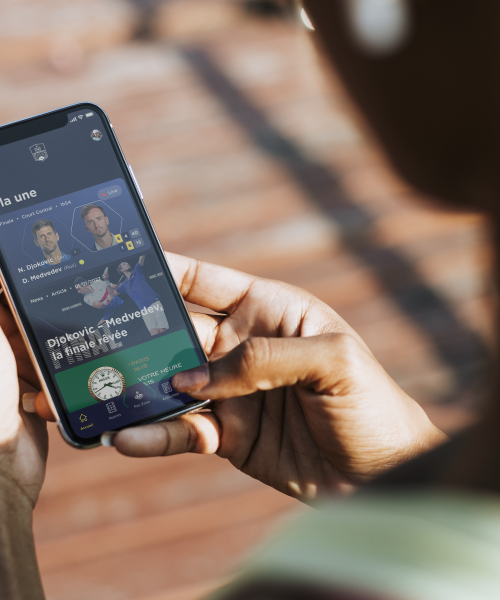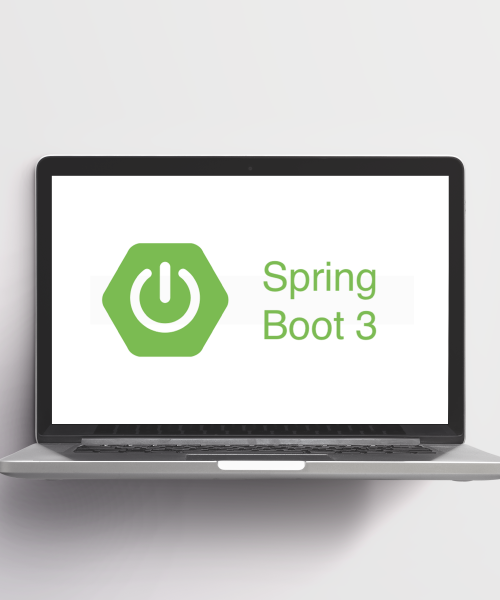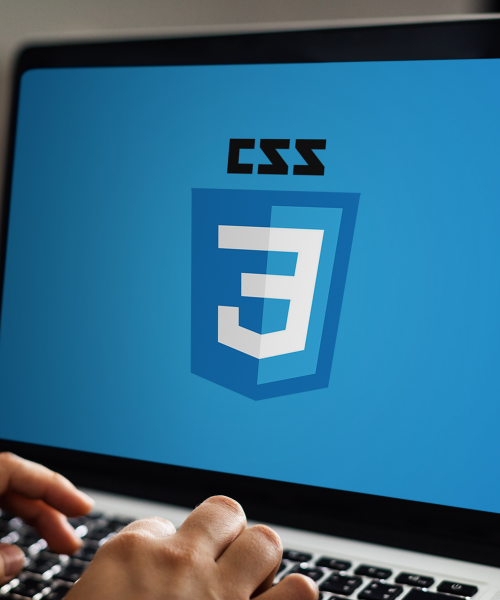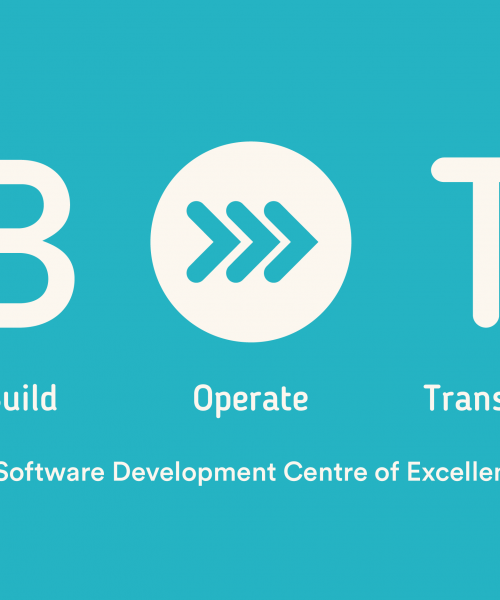According to the McKinsey ‘Women in Tech’ study, women represent only 22% of the European Tech workforce, all positions combined. Convinced that the representation of women in Tech is part of the solutions, we offer you an overview of the career of three of our technical experts, who work in different areas of the Tech ecosystem.
Ludivine, Estelle and Line, share their career path, their vision of the digital sector and the difficulties they encountered. They also talk about their role models, the lack of gender diversity in teams and its impact on their daily life. And they also give their advices to move towards more gender-balanced teams.
What is your job? And what kind of project are you currently working on?
- Ludivine: I am an Android mobile developer, with self-training on Kotlin language.
I am currently working on the development of an application for a luxury company. I am part of a large team with 15 iOS developers, 15 Android developers, Scrum, PO, PPO, UX, QA, … - Estelle : I joined the team as a development engineer. And on my current mission, I am a technical-functional tester for a major group in the field of mobility. I am responsible for the software quality of the website. For this, I work with a team of seven people including Scrum Masters, POs, business testers and several developers. I was the only woman on the project so far, and a second tester has just arrived in support.
- Line : I am Innovation & Solution Manager for the Self-service Analytics expertise, within the data division. As such, I take care of the pre-sales part for the Tableau solution. It is a self-service analytics solution for enterprises and data visualization. And I am also responsible for the development of the solution related to this expertise, as well as the French-speaking Self-service Analytics community.
What was your career path to this position?
- Ludivine: It is a reconversion. I have an initial training in audiovisual and multimedia. At the time, the multimedia part included learning code, like Java, but I found it austere. So I first made a career in audiovisual before retraining in 2019.
For this, I went through a bootcamp at the Wild Code School with a 5-month training followed by an internship in an DSC.
Despite the Covid my internship went well and I was hired. And then I was launched! - Estelle: I knew right away that I wanted to work in computer science! But that was more than 20 years ago, and in 1998 there was not yet the range of training that we have today in this field. There were a few prestigious schools, but they were not financially accessible. After a scientific baccalaureate, I had to search hard to find one of the few training courses of technical assistantship in apprenticeship. I was able to start my training, in the same time that the beginning of providers and Internet access. I bought magazines and books, because I also had to train on the side to be at the level of others, who already had some basics that I did not have.
After my work-study program, I was hired on a permanent contract and my career began. First as a technical assistant, then assistant project manager, project manager and business analyst. I then discovered software testing in 2014. And I stayed in that branch.
In this journey, I also benefited from internal training and I even resumed studies with a degree in computer science in London. I have never given up until today. - Line: Basically, I’m an engineer with a specialization in environment. For 14 years (including 10 internationally), I held several positions within the Veolia group.
During this career, I have dealt with data in several forms. And I realized that on these different workstations, there was a common thread on ‘what could we do around data?’ and how it could be used by business users.
The job of data scientist was emerging, and I started taking online courses through Udemy to learn data science skills, Python coding, and do machine learning. I realized that I was interested most in the data visualization part. I participated in many challenges in this field and I posted on social networks: That’s how I was spotted by Positive Thinking Company.
How did you come up with the idea of doing this job?
- Ludivine : I went because there were professional opportunities. I had already briefly seen what it looked like, so it wasn’t completely unknown. Even if, honestly, it did not particularly thrill me to have to reconvert. And I wasn’t sure I would like it either. But after two weeks of training, I was reassured and I knew it was for me.
- Estelle : At the time, I had a friend who had a computer at home and we went to her house to play it. I would never seen a computer before and I think that influenced me a lot as well. I already had a strong interest, but it was the catalyst for my passion. As a high school student, I also set up my own PC tower. And I bought my first screen second-hand. I had this desire to enter this field. That is what guided and encouraged me throughout.
- Line: I did a skills assessment to validate my interest, with a business survey part. And in my reading, I also came across Cole Nussbaumer Knaflic, who developed a methodology around data visualization and data storytelling, which she deployed at Google. I was very inspired by that, and all of these influences helped me chart a path in the vast world of data.
And in the end, even if I hadn’t held a data-labeled position before, I was already doing data analysis in the end.
How has your perception of the Tech world evolved?
- Ludivine : I had the image of people in front of their computers all day. Which is also true. But I did not have the vision of everything around: teamwork, learning, meetings, … Even if there are many, there is not only code all day long. I saw quite quickly that it was also something else.
- Estelle : At first I saw more of the games aspect. And then I wanted to go further on the operation, the technical and hardware side of the computer. Then by forging professional affinities with developers, I learned how they developed and created programs. And also by seeking to push further my support in assistance, I ended up doing development myself. And it was by taking an interest in code that I moved to the other side of the computer, from hardware to software.
- Line: For me, Data was very much related to IT and I had colleagues in the past who were part of development teams. So I had an idea of what they were doing. But concretely, I did not necessarily know what was expected on the position, and there was a whole part related to integration that I had no idea. I haven’t changed my image since, but I have a better understanding of the IT ecosystem.
Do you have role models in this job?
- Ludivine: I didn’t have people in my close circle who worked in this profession. So initially I didn’t have a particular model.
Now, I regularly consult and sometimes participate in the Slack Les Duchesses, a group of women in development.
I also went to a meeting of Lyon women developers in a café. To see what’s going on and follow the news, but not specifically because they were women.
My role models can also sometimes simply be more experienced colleagues. - Estelle: I didn’t have a role model at the beginning, on the contrary, it was even a little dissuasive. But I bought magazines and I was mostly driven by curiosity. My classmates and neighborhood friends were moving into other areas, so I even isolated myself a little to tinker on my computers, set up internal networks, …
Now there are people I follow on social media: Michael Bolton, a developer tester and James Bach who was my mentor in the field of software testing. I also follow a lot the blog of Lisa Crispin, a leading tester in her field, and Emna Ayadi, also recognized in the test. And finally I am also a member of the Ministry of Testing, a testing community. - Line: Cole Nussbaumer Knaflic again. I’m part of their online community called Storytelling with data. I regularly participate in challenges organized by his team. It also shares many resources. And this makes it possible to continue to develop skills and progress in practice.
There is also Nadieh Bremer, specialized in data visualization, but rather focused on data art. Her work is very original and it deals with different, complex and interesting subjects.
Otherwise my twitter feed is really related to data visualization, and I also follow a lot of what is done in the Tableau community, like the initiative #MakeoverMonday.
Finally, I am co-organizer of the Meetup group DataViz Nantes, and through this I also meet people in the field.
Have you encountered any particular difficulties in your professional career?
- Ludivine: Everything went quite smoothly. With a complete change of job, I expected to have difficulties, but this was not the case. The training immediately interested me, and being passionate makes everything more pleasant. I also found the internship very easily, at a job dating with my training school.
There was still some stress because I was then a total junior, with a training that does not necessarily have much value for some companies. But once in office, despite the Covid, everything went well. After, I also had a career behind me, I didn’t arrive as a complete novice in the corporate world either. And while there may have been a lack of confidence at the outset, which may be understandable, it has been okay in the long run. - Estelle: It wasn’t easy! I missed information a lot to guide and orient me. But fortunately, today it is very different and we have access to much more information and more easily.
In my entourage, I was also the only one who had this desire to go into this field. So I didn’t necessarily have support and accompaniment. My close environment didn’t really encourage me, especially since it was expensive. There was indeed a barrier to access because of the cost and reduced choice of training. I did odd jobs to make pocket money and to buy equipment. But later, when they realized that it was serious, my parents understood that I needed support. But it came little by little.
The main obstacles have therefore been access to information, a lack of support and guidance assistance, inaccessible training and no model to identify with. - Line : The difficulty I had was that I did this at a time when I wasn’t at my best on a personal level. It is not easy to go back to training feeling tired. It must have slowed down my progress a little. But otherwise I had no particular difficulty. On the contrary, we are lucky that there are now so many online courses. It was really easy to take quality courses in a flexible way. During my training, I was still living in the United Arab Emirates and there were no courses on data science there. So that’s what allowed me to move forward on the subject.
What proportion of women are on your team? In your professional environment?
- Ludivine : In my training the parity was 50/50. On profiles in reconversion, in my session anyway, it’s really mixed. On the other hand, after in the teams in which I worked, not at all. It is rather rare to meet female developers. UX/UI, Scrum more easily, but few developers.
- Estelle : Overall it’s a male domain. In the tests a little less, but I am usually accompanied by men and always in the minority.
- Line: I think it really depends on the circles you look at. With customers it can be variable, equal or not. In the Self-Service Analytics community, on the other hand, we are a majority of women (70%). But I think it’s specific to this community, because when I look at other circles, like the Data division in France on the Solution part, it’s a majority of men, I’m the only woman. On the other hand, internationally, in Germany for example, there are more women in proportion.
But, we still see stereotypes on certain schemes related to Business Intelligence, where for the data analysis part they put a female pictogram, and for the data integration and processing part, they put a male pictogram.
Does it have an impact on your work? Would you like it to be different?
- Ludivine: As with any profession, it would be better if it were more mixed. After that, I think things are moving, because it’s a young environment, with the awareness that there is a need to feminize teams.
And while the words aren’t always inclusive, I’ve never felt uncomfortable either. In some cases, it may have been thought that I was less competent. But this is not a generality and rather anecdotal. And it’s not necessarily specific to the tech world.
On the other hand, the world of development is also composed of many young single men, or who do not yet have a family life. So where they will potentially be able to take personal time to do technical monitoring and develop skills, I can afford it less time as a mother. This may be the case for other professions, but in Tech it is necessary to follow the news regularly to not be overwhelmed, and I feel that I have less time available. Fortunately, we share our technical monitoring and knowledge as a team, which still allows me to access it. - Estelle: When you are a woman in a mainly male field, there is sometimes condescension because you are a woman. People don’t hide it. But it also goes very well sometimes, like in my current team. For me, this challenge also allowed me to surpass myself to be recognized, listened to, and proven that I was there because I deserved it.
So I was impacted on the fact that I always wanted to train and surpass myself. But sometimes it is not easy if you are not recognized for what you do, and you can have moments of discouragement and loss of self-confidence.
The lack of recognition can therefore impact team dynamics, and it can also sometimes be difficult to integrate into an already tight-knit men’s team. Communication helps a lot. Today I am recognized and I have my place in the team. But at first it was difficult to have this self-confidence when you arrive and you are not necessarily recognized right away. - Line: I think that as a woman engineer in general, you are often confronted with being in the minority. You can see this just by looking at the numbers of women in engineering school. In my promotion we were a ‘good’ proportion of girls, while we were only 25%. I am in favour of reversing the trend.
Do you have any suggestions for a more gender-balanced workforce?
- Ludivine: Act on initial formation! Compulsory mathematics was removed during 2 years. It hurt a lot, especially for girls who don’t go into these fields as much.
For continuing education or retraining, also further develop introductory workshops. Whether specifically for job seekers, but also for women who are not yet at all focused on this field. It allows us to discover, try and realize that Tech can please us. This is not necessarily an area to which all women will turn spontaneously, because it is still a stereotypical sector. So it’s a good idea to bring it to them.
For companies, they should continue to want more diversity in teams on all businesses, including development. And also offer a fair wage!
I have an example of a female friend who was more competent than one of these male colleagues and who was paid 10% less. With the current context of fast-growing market, this kind of companies are running away! But it’s still not normal! - Estelle : Awareness-raising through associations and education. It is important to raise awareness among young people as early as possible in training. Today we introduce development professions sometimes in college, but we should go even earlier. Our daily lives are digitally driven. It is therefore necessary to give keys to understanding it as soon as possible. From kindergarten we can start to educate to understand the concepts of computer science, with Lego for example. If children are educated in these concepts, and have a vision of how digital works, it will be easier to then resume these courses in middle and high school. There will then not necessarily be a need for long studies to decide and orient oneself.
- Line : I am rather in favour of quotas, at the level of operational teams and management. There is also an awareness to be made among young girls in schools, but early enough from primary school, then college, so that girls do not self-censor and go to scientific paths. It is also necessary to give visibility to people experienced in Tech or in scientific careers to give examples. And these models must be put forward at all times: in the school career, during retraining paths, in mutual aid networks, … It helps that we can share on topics related to the fact that we are a woman. And it is important to support each other.
What advice would you give to someone wishing to start a Tech profession? And to women in particular?
- Ludivine: Try it! It takes a little logic and knowledge in maths, but you might take advantage of the many self-taught training available. Sometimes we get frustrated because we can’t solve a problem. Then when you do, it’s small daily victories that give satisfaction. It’s perfect if you like to find solutions, solve puzzles.
But it’s also important not to close doors, even if you haven’t done math or science. - Estelle: We are in a digital world, advanced in a dynamic of digital transformation. We cannot live today without being impacted by digital technology, whether in the personal or professional field. It is therefore important to follow the movement and take an interest in the professions of the future. Especially since there are a lot of needs and opportunities.
In addition, there is a strong diversity in the digital professions: in development, but also tests, UX, UI, …
Today I am promoting that women should not be afraid to enter this sector. There are more and more code tools that are intuitive, easy to handle and accessible to everyone. With the development of agility, the field and projects have evolved, there is the development side but also soft skills: adaptability, communication and interaction with a team. With equal skills, women can also bring a new vision on certain things.
Through the association 10,000 coders, I train young girls, and I ask them not to be afraid and not to feel wronged. I ask them to learn about these professions in which we can be autonomous and fulfilled. - Line: The important thing is to learn about the job. Data, for example, is a vast field. So we can try to meet people who are in this field to understand what they are really doing, to help us target what interests us. There is LinkedIn, Meetups, internships, … It is therefore easily possible to inform yourself and start training on the basis to validate what you like and move towards something you like.
Also leading small personal projects in the field, and in particular via community initiatives, such as Data for good, makes it possible to get a first foot in data by having a positive social impact.
About women in business, I recommend this book written by Sheryl Sandberg former CEO of Facebook Lean In: Women, Work, and the Will to Lead!
To deepen this subject you can also find our article on the impact of the lack of diversity in the Tech professions and the means of action to change the situation:
We regularly publish articles on topics of web and mobile product development, data and analytics, security, cloud, hyperautomation and digital workplace. Follow us on Medium to be notified of the next articles and carry out your professional watch.
You can also find our publications and news via our newsletter, as well as our various social networks: LinkedIn, Twitter, Youtube, Twitch and Instagram
Want to know more? Check out more of our website and our job offers

